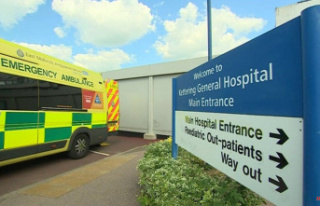One-year-old daughter of a girl who has an illness that makes muscle into bones was diagnosed by her mother. She urged the government for more funding to support research into rare conditions.
Lexi Robins of Hemel Hempstead is afflicted by the rare condition Fibrodysplasia Obsificans Progressiva.
Alex Robins, her mother, stated that despite promises from the government, no funding for research into the condition has been received.
Maria Caulfield, Health Minister, stated that PS22bn was committed to rare diseases by 2027.
Mrs Robins stated that Lexi was born January 2021 after a normal pregnancy. Everything was fine.
Mrs Robins noticed that Lexi's big toe bent inwards when she and David brought Lexi back home to Hertfordshire.
Mrs Robins stated, "I wheeled her into the maternity unit for someone to check her,"
"They took photos and told us it was bunions. I wasn't convinced."
Source: National Organization for Rare Disorders
Mrs Robins stated that Lexi had fused thumbs after months of testing and missing the "knuckle" and top bones in her big toes.
She stated that she did her own research and was convinced Lexi had FOP.
Genetic testing confirmed that Lexi had FOP by June 2021. Mrs Robins was unable to accept the results.
"I kept fighting and fighting. I didn't accept it."
Mrs Robins discovered that there was only "limited research globally" on the condition, and that only one UK facility, Oxford, had studied it.
"I was told by FOP Friends that the charity must raise almost PS200,000 per year to maintain this laboratory in order to find a cure.
She said that FOP means that your child has been diagnosed with the disease. "You also need to raise funds to find a cure - there is nothing on the NHS."
The family raised PS170,000 within a year to raise awareness and created a petition for funding rare diseases.
Although a debate was held in December, no funding specific has been committed to FOP research.
Lexi's parents consider safety and well-being the most important thing.
Mrs Robins stated that "one of the most common things about flare-ups is that some of them are caused by injury or a fall."
The family sold their home and is now building a custom bungalow with soft furnishings and no sharp corners.
They stated that the goal of the new home was to keep her "as safe as possible, under care, to help prolong her life."
Mrs Robins stated, "We must fight for the hope of a cure." It's overwhelming, but you will do anything for your kids."
When Mrs Robins addressed the government, she asked: "When will you step up?"
"We have raised the money, got the signatures and nothing has happened."
"We don’t fit into the rare disease [category]" - we need resources to find a cure, with a research team as well as a nurse dedicated to FOP patients.
"We must act now. People like Lexi will suffer if funding is delayed for years.
Mrs Robins stated that Sir Mike Penning is her Hemel Hempstead MP and she supports him.
Sir Mike stated that the FOP campaign was all about momentum.
He said, "We must keep the pressure up." "I will continue pushing ministers to push scientists that will decide on funding."
Maria Caulfield, Health Minister, stated: "I am aware that rare diseases such as FOP can pose enormous challenges for people living with them and I want to thank Lexi and her family who brought attention to this important topic.
"It is vital that we continue to improve our understanding and cure rare diseases. That's why we have committed to increasing overall research spending to PS22bn by 2027.
She also mentioned that funding for research was available through the National Institute for Health and Care Research, (NIHR).
To further its efforts in understanding and characterizing rare diseases, the government has committed PS40m to the NIHR BioResource network of clinical and academic experts.
BBC News: East of England is available on Facebook, Instagram, and Twitter. If you have a story suggestion email eastofenglandnews@bbc.co.uk












